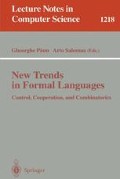Abstract
Subclasses of grammar systems that can facilitate parser construction appear to be of interest. In this paper, some syntactical conditions considered for strict deterministic grammars are extended to cooperating distributed grammar systems, restricted to the terminal derivation mode. Two variants are considered according to the level to which the conditions address. The local variant, which introduces strict deterministic restrictions for each component of the system apart, results in local unambiguity of the derivations. The total variant, which extends the strict deterministic constraints at the level of the entire system, results in some cases in global unambiguity of the derivations.
Research supported by the Academy of Finland, Project 11281, and the Alexander von Humboldt Foundation
Preview
Unable to display preview. Download preview PDF.
References
A. Atanasiu, V. Mitrana, The Modular Grammars, Internat. J. Comp. Math. 30 (1989), 17–35
H. Fernau, M. Holzer, H. Bordihn, Accepting Multi-Agent Systems: The Case of Cooperating Grammar Systems, Computers and Artificial Intelligence 15 (1996), No. 2–3, 123–139
E. Csuhaj-Varju, J. Dassow, On Cooperating Distributed Grammar Systems, J. Inform. Process. Cybern., EIK, 26 (1990), 49–63.
E. Csuhaj-Varju, J. Dassow, J. Kelemen, Gh. Păun, Grammar Systems, Gordon and Breach, London, 1994.
E. Csuhaj-Varju, J. Kelemen, Cooperating Grammar Systems: A Syntactical Framework for the Blackboard Model of Problem Solving, Proc. Artificial Intelligence and Information-Control Systems of Robots '89, North-Holland Publ. Co. (I. Plander, ed.), 1989, 121–127.
J. Dassow, V. Mitrana, Cooperating Pushdown Automata Systems, Submitted, 1995.
J. Dassow, Gh. Păun, G. Rozenberg, Grammar Systems, in The Handbook of Formal Languages (G. Rozenberg, A. Salomaa, eds.), Springer-Verlag, 1997.
M. Harrison, Introduction to Formal Language Theory, Addison-Wesley Publ. Co., 1978
J. E. Hopcroft, J. D. Ullman, Introduction to Automata Theory, Languages and Computation, Addison-Wesley, Reading Mass., 1979.
V. Mihalache, Coverability Trees for Grammar Systems: A Strong Decidability Tool, submitted
R. Meersman, G. Rozenberg, Cooperating Grammar Systems, Proc. MFCS '78 Symp., LNCS 64, Springer-Verlag, 1978, 364–374.
P. H. Nii, Blackboard Systems, in The Handbook of AI, vol. 4 (A. Barr, P. R. Cohen, E. A. Feigenbaum, eds.), Addison-Wesley, 1989.
Author information
Authors and Affiliations
Editor information
Rights and permissions
Copyright information
© 1997 Springer-Verlag Berlin Heidelberg
About this chapter
Cite this chapter
Mihalache, V., Mitrana, V. (1997). Deterministic cooperating distributed grammar systems. In: Păun, G., Salomaa, A. (eds) New Trends in Formal Languages. Lecture Notes in Computer Science, vol 1218. Springer, Berlin, Heidelberg. https://doi.org/10.1007/3-540-62844-4_9
Download citation
DOI: https://doi.org/10.1007/3-540-62844-4_9
Published:
Publisher Name: Springer, Berlin, Heidelberg
Print ISBN: 978-3-540-62844-6
Online ISBN: 978-3-540-68703-0
eBook Packages: Springer Book Archive

